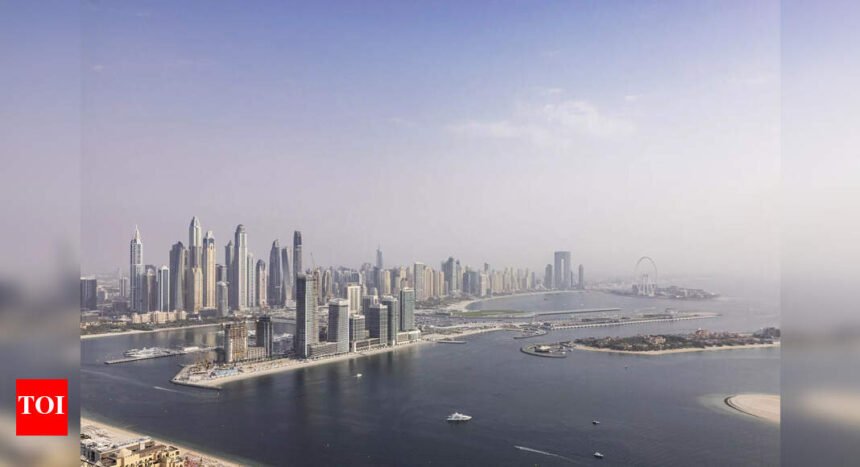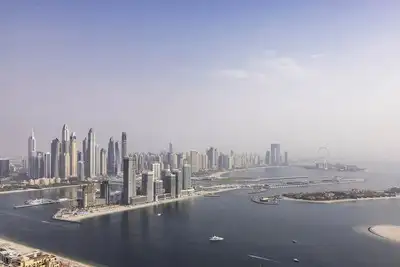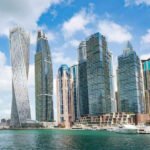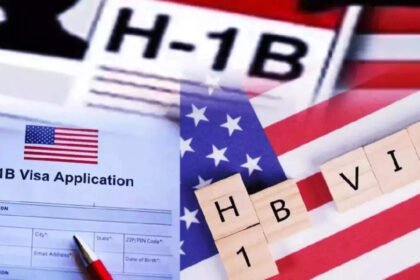TL;DR: Dubai has diversified far beyond oil; today, non-oil sectors like trade, logistics, tourism, finance, and tech drive 99% of its GDP. Investor-friendly policies such as full foreign ownership, zero personal tax, Golden Visas, and free zones have attracted Fortune 500 firms, startups, and global high-net-worth individuals.World-class infrastructure (ports, airports, fintech zones) and a multicultural, skilled workforce strengthen its competitive edge. Its strategic location (within eight-hour flights of two-thirds of the world) positions Dubai as a global gateway to Asia, Africa, and Europe.
1. From Oil Dependency to Diversified Economy
Once reliant on petroleum, today oil contributes under 1% to Dubai’s GDP down from around 50% in the past. Modern growth is driven by trade (26%), transport/logistics (12%), financial services (10%), manufacturing, real estate, construction, and tourism combined.
2. Policies That Attract Global Business
Dubai offers an unusually welcoming business environment:
- Free zones like DIFC (financial), JAFZA (industrial), and Dubai Internet City offer tax holidays, 100% foreign ownership, and full repatriation of profits.
- Golden Visa and long-term investor residency tied to property or business investments add stability for expatriates and capital inflows.
3. Infrastructure That Connects the World
Dubai’s logistical backbone is unrivaled:
-
Jebel Ali Port is the world’s largest man-made harbour and a global transshipment hotspot. - Dubai International Airport (DXB) and Al Maktoum (DWC) provide seamless connectivity to 240+ destinations putting two-thirds of the global population within eight flight hours .
- Logistics and trade zones like DP World’s facilities and multifaceted free zones enhance operational efficiency.
4. Financial Ecosystem & Innovation
Dubai is a magnet for global capital and innovation:
- DIFC hosts ~6,900 companies, offers common-law jurisdiction, and a 50-year tax guarantee. It has added nearly 1,800 new registrations in 2024.
- Wealth management boom: Asset managers grew from 350 to 410 firms in DIFC during 2024. Dubai is on track to be the world’s 6th-largest asset booking hub by 2028.
- FinTech Hive, fintech accelerators, and tech-focused free zones reinforce the emirate’s role as a tech ecosystem.
5. Diverse Talent Pool and High Foreign Direct Investment
- Multicultural workforce: With high density of expats, Dubai is a melting pot of talent from 200+ nationalities.
- FDI engines: In 2024, Dubai attracted AED 52.3-billion in greenfield FDI, ranking first in the MENA region for such investments.
- Population growth: Nearly 3.8 million residents by end-2024, plus a daytime influx of commuters, creating strong consumer and workforce density.
6. Tourism & Real Estate Synergy
- Retail and luxury dominance: Ranked in top 10 globally in luxury upgrade market; retail contributes significantly to GDP and urban vitality .
- Real estate investment: High yields, dual-use visa-linked residence, and rapid off-plan growth support sustained investment demand.
- Tourism as a retail driver: Huge number of visitors in 2024 supported retail, hospitality, and rental markets.
7. A Resilient Economic Powerhouse
Dubai is consistently ranked among the most competitive cities worldwide:
- Global City and Power rankings: Leading the MENA region in Global Power City Index.
- Dubai’s GDP reached AED 429-billion in 2023, with non-oil sectors dominating.
- DIFC revenue surged: 37% growth in 2024, underlining regional financial prominence.
Dubai’s dominance is built on a multifaceted ecosystem: pro-business policies, world-class infrastructure, diversified economy, global financial services, and vibrant expatriate & investor communities. Rather than relying on oil, the emirate thrives as a global conduit welcoming capital, innovation, and people, all while cementing its role as the Gulf’s economic front runner.







